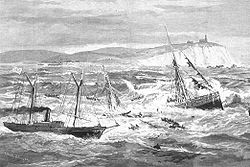City of Columbus
 City of Columbus and Revenue Cutter Dexter Schell and Hogan, 1884 | |
| Career | |
|---|---|
| Owner: | Boston & Savannah Steamship Co. |
| Launched: | June 19, 1878 |
| Fate: | Ran aground January 18, 1884 on Devil's Bridge off Martha's Vineyard |
| General characteristics | |
| Tonnage: | 2,250 tons |
| Length: | 275 ft |
| Beam: | 26 ft |
| Draught: | 26 ft |
| Propulsion: | Steam and Screw |
| Complement: | 224 |
The passenger steamer City of Columbus ran aground on Devil’s Bridge off the Gay Head Cliffs in Aquinnah, Massachusetts in January 1884. She was owned by Boston & Savannah Steamship Co. and was built in 1878. She was an early iron steamer with a tonnage of 2,200. She drew 26 feet and had a length of 275’ and Beam of 26’. She was powered by steam and screw. She ran from Boston, Massachusetts to Savannah, Georgia.
The shipwreck
On January 17, 1884 the steamer City of Columbus left Boston with a crew of 45 under the command of Captain S.E. Wright. Wright was very familiar with the area as he had made numerous trips through the reefs and sound of Martha's Vineyard. It is reported that the ship was filled with “invalids” that were heading south to escape the northeastern winter. On the morning of January 18 the evening sky was so clear that stars were visible. A gale moved in out of the west causing high seas as the ship was heading out to the open ocean. The Captain left the City of Columbus’ wheel in the hands of his Second Mate Edward Harding and went below to sleep.
While off Martha’s Vineyard on the early morning of January 18, the lookout yelled to the Second Mate that they were close to Devil’s Bridge buoy, just before the ship struck a double ledge of submerged rocks. The Second Mate ordered the quartermaster to go hard port and once again the City of Columbus smacked against the reef. The commotion awoke Captain Wright. The Captain attempted in vain to free the ship. Attempts to use the sails only pushed the boat further into the reef. After these vain attempts he decided to go over the “obstruction”. This just made things worse. The captain gathered the 87 passengers from below and was in the midst of explaining their situation when a rush of water into the cabin forced all to the top deck, where a giant wave struck the boat and swept all women and children, and many of the men, into the frozen waters.
Two life boats were launched from the City of Columbus only to have the ocean waves smash them against the iron sides of the ship. Passengers and crew attempted to stay afloat in the rough seas by holding onto the rigging of the ship. Lighthouse keeper Horiatio N. Pease and a complement of Gay Head Wampanoag Indians braved the waves in rowboats to save passengers that had held on. The ocean was so rough that the Indians feared approaching the steamer would cause their own boat to get smashed, so they called to the men to dive off the rigging and come to the life boats. Some of those who attempted this were saved by the Indians.
The rescue effort was then continued when the Revenue Cutter Dexter skippered by Captain Gabrielson came to their aid. The Dexter, being a smaller ship, was able to move about the wreckage and pull survivors off the rigging and masts. Two of the survivors were actually unconscious and Lieutenant Rhodes saved them by tying himself to a rope and swimming to the wreck. Even after being hit with a piece of wreckage, he continued and climbing the rigging to bring the men back to safety. The rescuers managed to save 29 people. Approximately 100 people froze or drowned. This incident was reported as one of the worse ocean disasters of its time.
External links
- http://lighthouse.cc/gayhead/history.html
- http://www.uscg.mil/hQ/g-cp/history/h_NEcoast.html
- http://www.wreckhunter.net/newrecks.htm
- http://www.mass.gov/czm/buar/shipwrecks/ua-alga.htm
- http://www.laesser.org/joomla/index2.php?option=com_content&do_pdf=1&id=534
